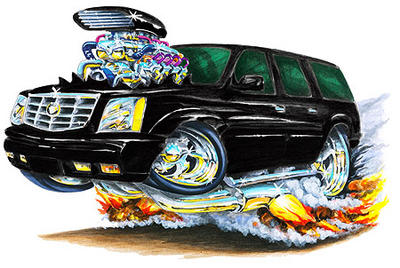Graphic of Osama: "LUV your SUV!"
"I'm funding terrorists, ask me how."
"SUV: Killing Americans at home and abroad"
And on the more postive side:
"Support Our troops? Buy hybrid."

And this from Andrea S.
IT CAN BE DONE: A reader reminds me of Gregg Easterbrook's pro-Kerry piece last year pointing out how incentives to move away from SUVs and toward hybrids could have a cumulatively important effect on our oil consumption. Money quote (TNR, for reasons beyond me, keeps most of its content behind a subscriber wall):
A simple one-third increase in the mileage of new vehicles would have a remarkably beneficial impact on the United States-Persian Gulf relationship, and quickly.Of course, John McCain backs this strategy. 9/11 was the obvious opportunity to revolutionize American energy policy to rid ourselves of having to deal with Islamo-fascist cartels. Bush blew it.
Here's the math. About 17 million new cars and "light trucks" (SUVs, pickups, and minivans) are sold in the United States each year and driven, on average, about 12,000 miles annually. If the fuel efficiency of 17 million vehicles driven 12,000 miles annually rose by one-third, from a real-world 17 MPG to a real-world 23 MPG, that would save about 200 gallons of gasoline annually per vehicle, or about 3.4 billion gallons of gasoline. Since a barrel of petroleum yields 20 gallons of gasoline, about 170 million barrels of oil would be saved.
Perhaps you think, Aha! With U.S. petroleum demand at 20 million barrels daily, this MPG initiative has saved just about one week's worth of oil. Yes--in the first year, the MPG increase would have little effect, in much the same way that, in their first year, few investments yield much return. But remember the miracle of compounding! In the second year, with two model-years' worth of vehicles at the higher MPG, 340 million barrels of oil are saved. The next year, the savings is 510 million barrels, the next year 680 million, and so on. In just the fifth year of this initiative, we would need to purchase about 850 million fewer barrels of petroleum--approximately the amount the United States imports each year from the Persian Gulf states.
No comments:
Post a Comment